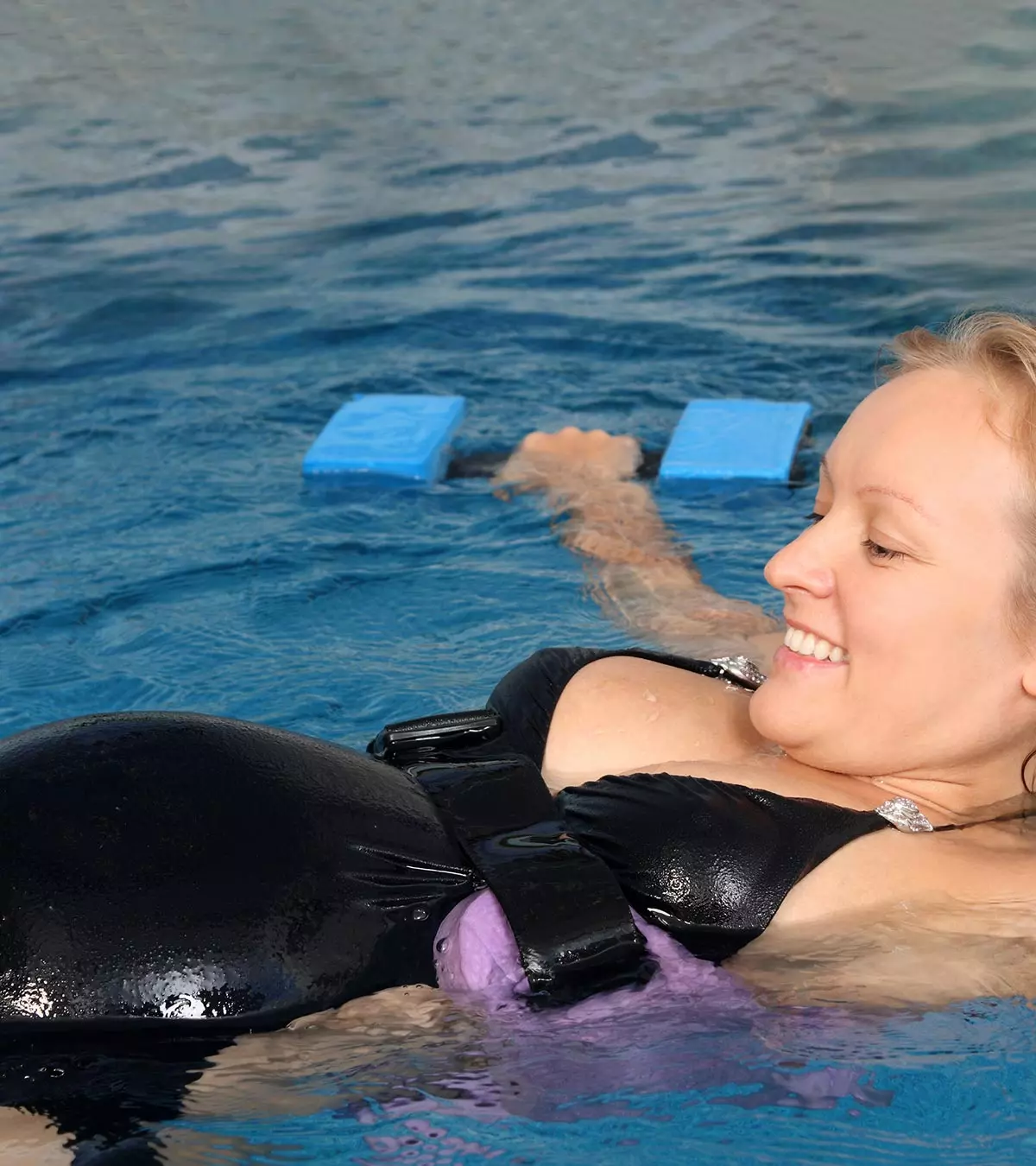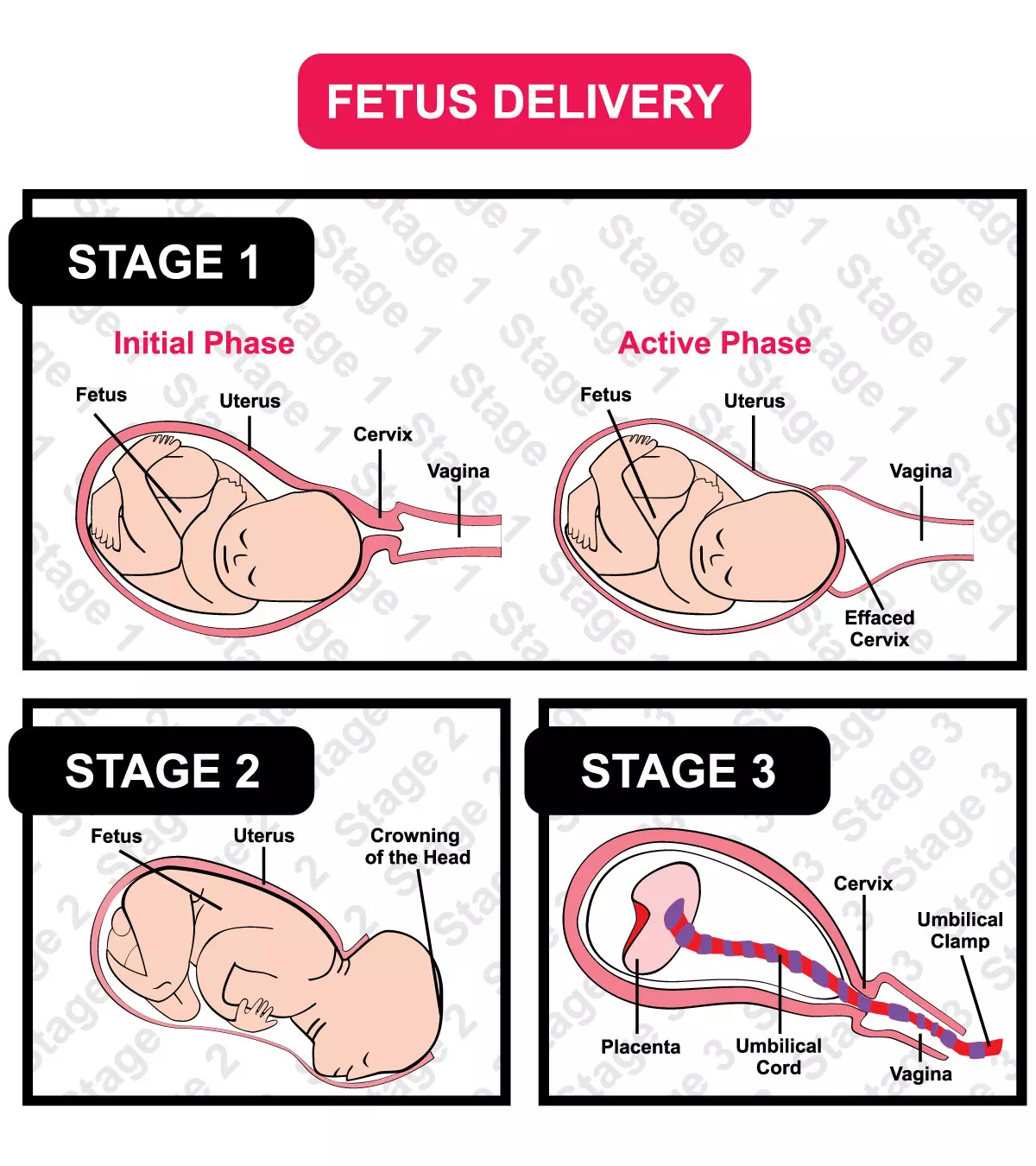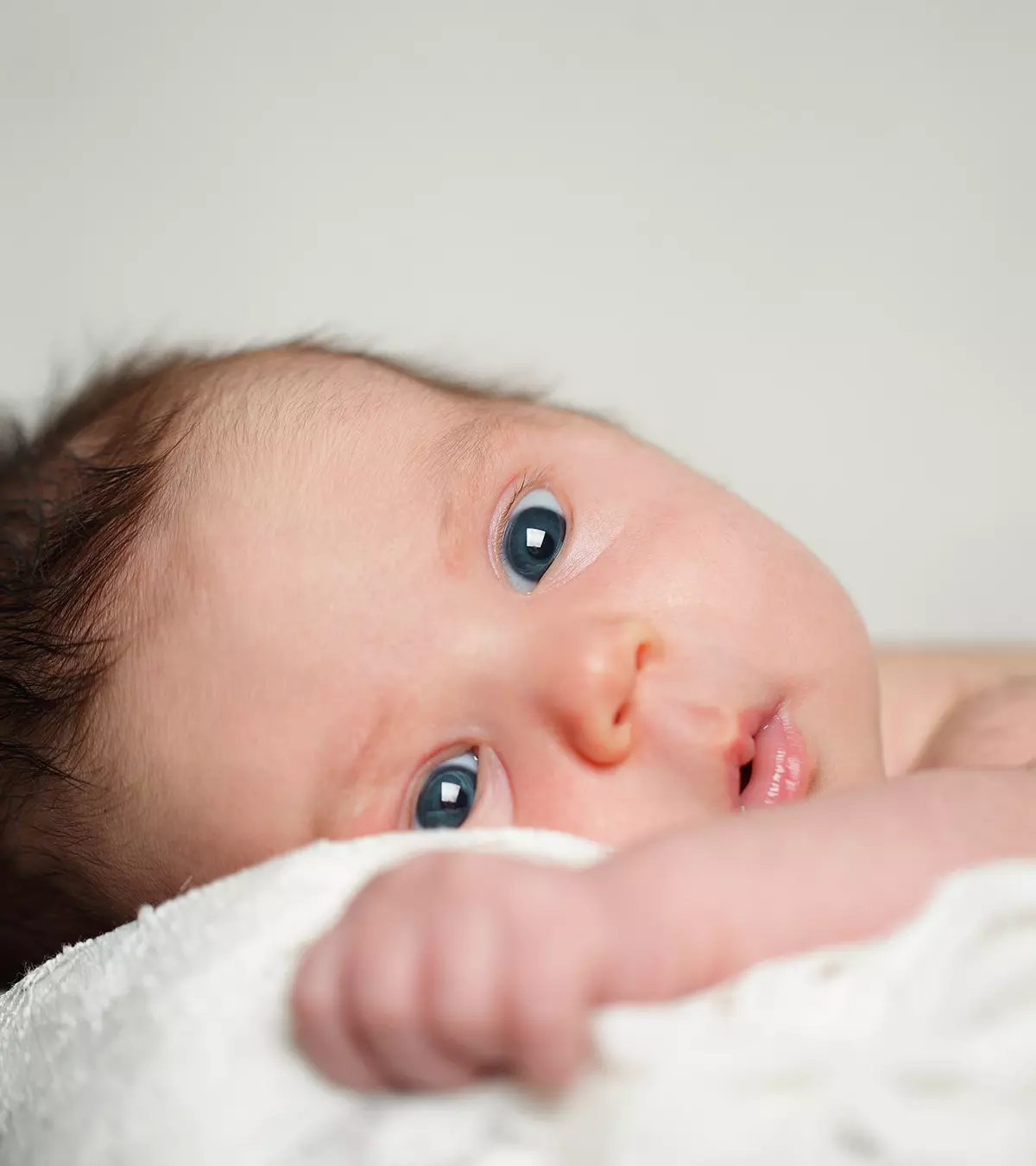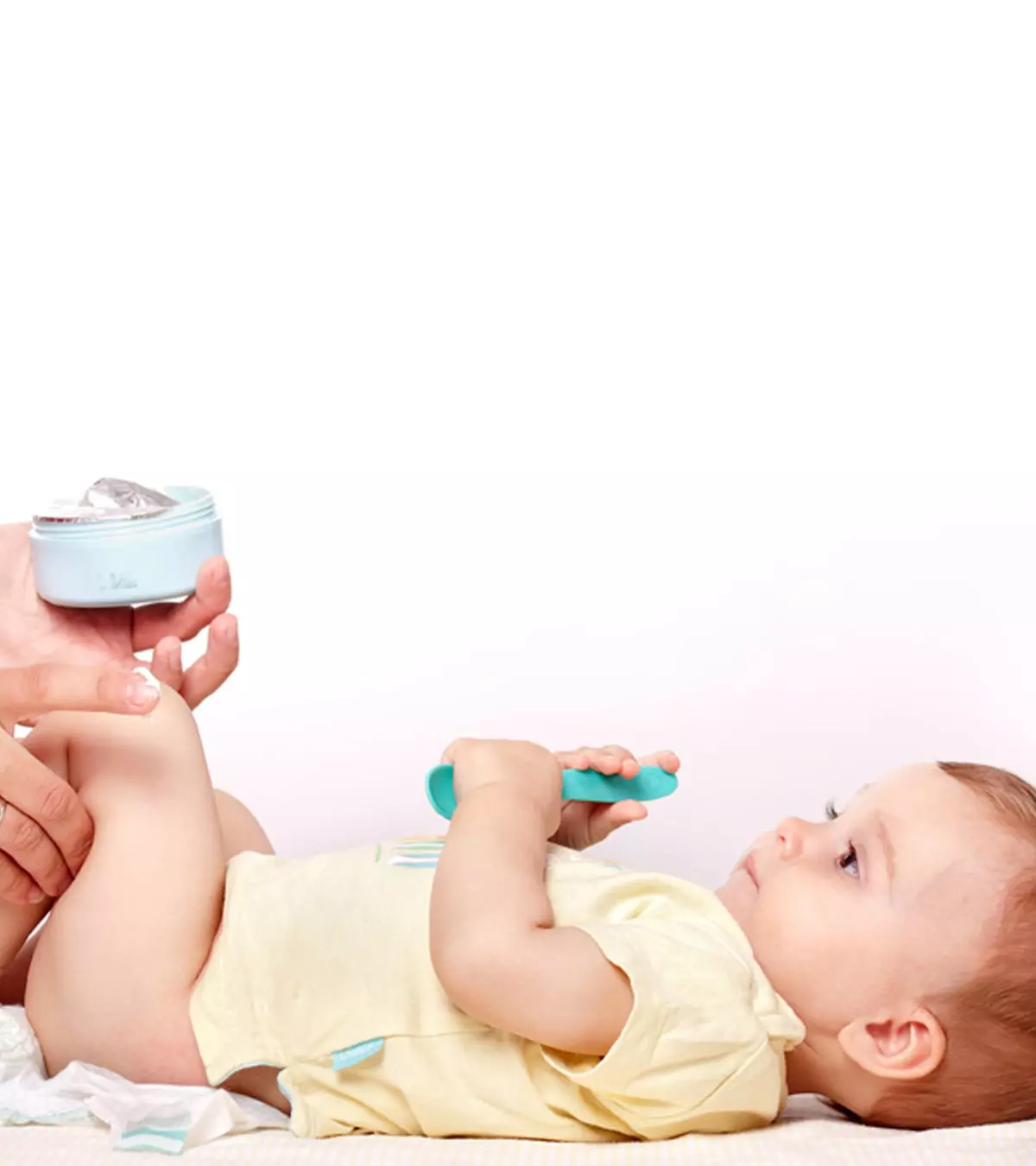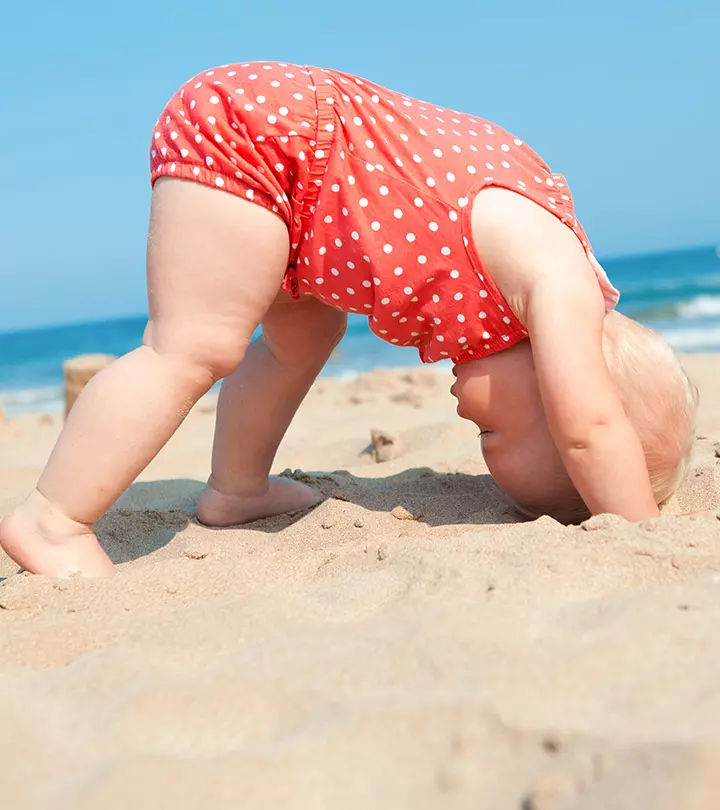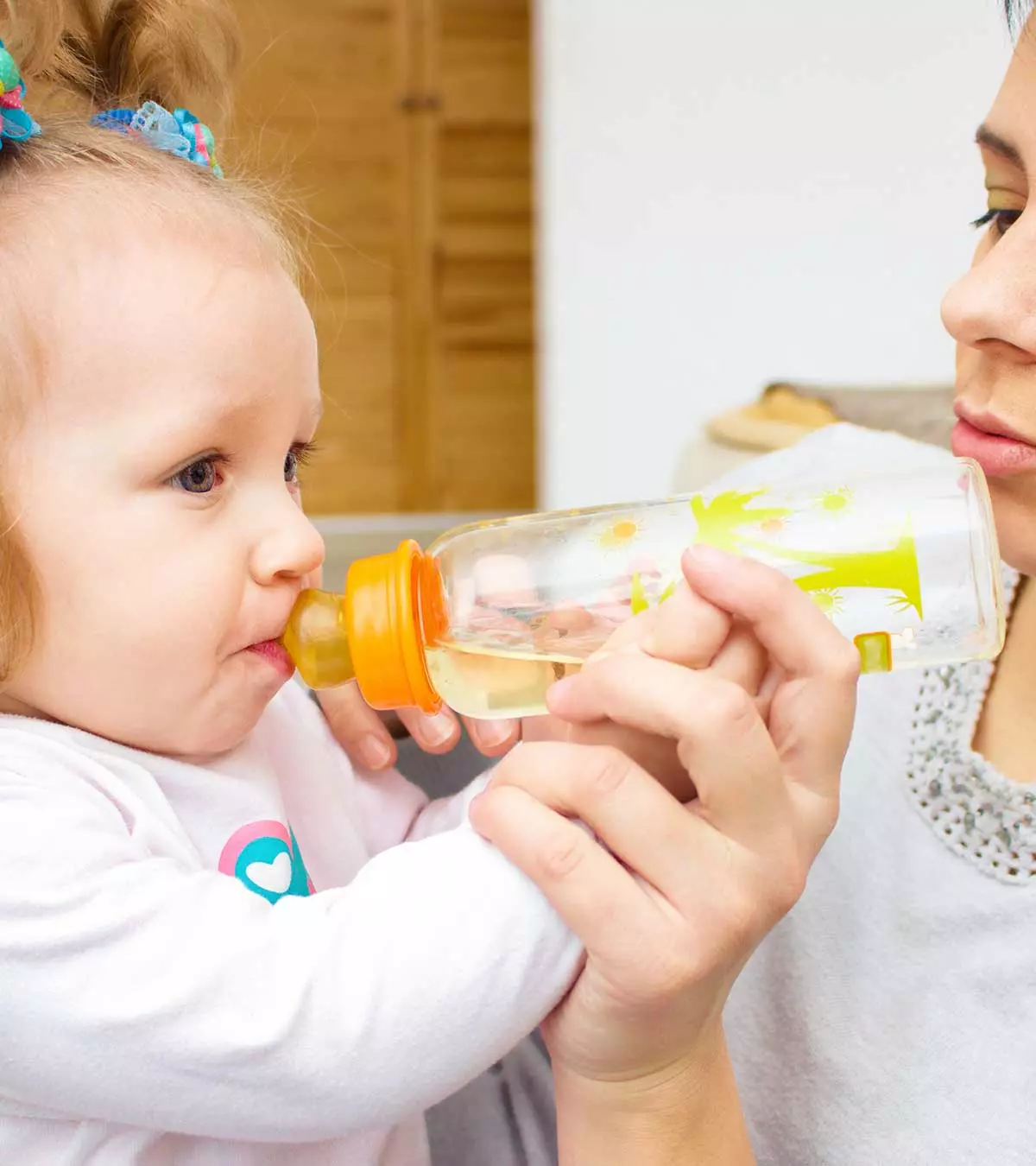
Most newborn, infant, or baby behaviors are adorable and surprising to their parents, and they may love watching them doing it. However, some behaviors, such as baby headbanging, may raise concerns and worries in parents.
Many babies and toddlers engage in headbanging as a self-comforting technique to reduce frustration, pain, or boredom (1). Although it can be alarming and indicate underlying problems in some cases, many babies do it as a way to self-soothe. Navigating the signs of baby head banging is crucial for parents, as it is a behavior commonly observed in infants and toddlers. Consider seeking a pediatrician’s opinion to identify the exact cause of headbanging in your baby.
Read on to know more about the causes of baby headbanging behaviors, ways to respond to it, and when to see a doctor.
Key Pointers
- Headbanging is a common self-soothing behavior used by babies to fall asleep around bedtime or naptime.
- Headbanging normally starts between six and nine months and ends around three years.
- If the habit lasts longer than three years, it may indicate a physical or mental illness.
- You may distract your baby from headbanging by giving them toys or play activities.
Signs Of Head Banging In Babies
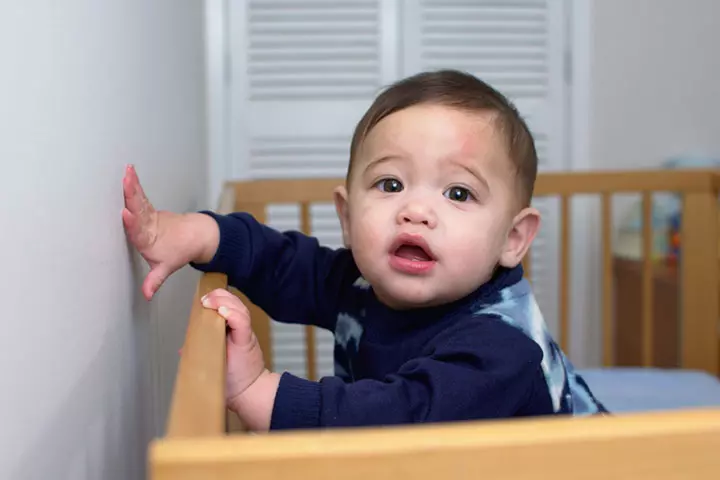
If your infant repeatedly bangs their head to a pillow, wall, or crib while rocking back or forth, it could be head banging. Babies usually do it around bedtime or naptime since the rocking motion helps them fall asleep (2).
Your little one may head bang while sitting in an upright position or while lying down in bed. Here are the common signs of head banging in babies (1).
- Repeatedly banging their head to the crib or mattress.
- Sitting up just to bang their head to the wall, cot, or crib.
- Rocking back and forth and banging their head as they rock forward.
- Lying on the back and head rolling from side-to-side forcefully enough to bang their head.
How Long Does Head Banging Last?
A head banging episode is brief and often lasts around 15 minutes. The behavior usually begins between the ages of six and nine months and stops by the age of three years. A few healthy children may display the behavior up to the age of five years. If this habit persists beyond three years, consult a pediatrician (2).
What Are The Possible Causes Of Head Banging?
Head banging in healthy babies could occur due to the following reasons.
- A self-soothing technique for sleep. Head-banging behavior is often observed before the baby’s bedtime. It is theorized that this rhythmic movement is similar to that of a rocking cradle, which calms the baby to sleep. Once the baby is well-slept, they will not display the behavior anymore.
 Quick fact
Quick fact- A response to boredom, frustration, or anxiety. Some babies may resort to head banging as a response to frustration or when they feel anxious. A baby who is bored may become fussy and head-bang. The behavior in such scenarios helps babies calm themselves.
- A form of self-stimulation technique. Some babies may bang their head to stimulate their vestibular system, which is part of the inner ear and helps the body maintain balance (3). Baby shaking their head, swaying, spinning, and rolling are some of the movements they naturally perform to stimulate their vestibular system and improve body balance. The movement may also help improve the brain’s neural networks and their functions.
Most babies head-bang for normal reasons. However, parents and caregivers often wonder if it might indicate an issue.
Is Head Banging A Sign Of A Health Problem?
Head banging in babies is a normal reaction and rarely a sign of health problems. It is a temporary behavior and unlikely to develop into a cognitive, emotional, or physical problem. You may consider head banging a self-soothing behavior, such as babies sucking hands.
Despite the benign nature of the behavior, sometimes it might indicate a physical or mental disorder, especially if head banging persists beyond the age of three years. In some cases, head banging might be associated with the following conditions.
- Autism: Children with autism spectrum disorder (ASD) tend to display head banging behavior. However, not every baby who head-bangs has or develops autism. If your baby points towards objects to communicate, it is their way of communicating with their primary caregivers and participates in games and activities, then is unlikely a manifestation of autism (4). The condition can be diagnosed by the age of 24 months.
- Stereotypic movement disorder: It is a disorder, which causes the child to make sporadic and repetitive movements (5). Head banging is one of its many symptoms, which include hand waving, nail biting, and rocking. The stereotypic movement disorder is often induced by other conditions, such as autism and Tourette syndrome.
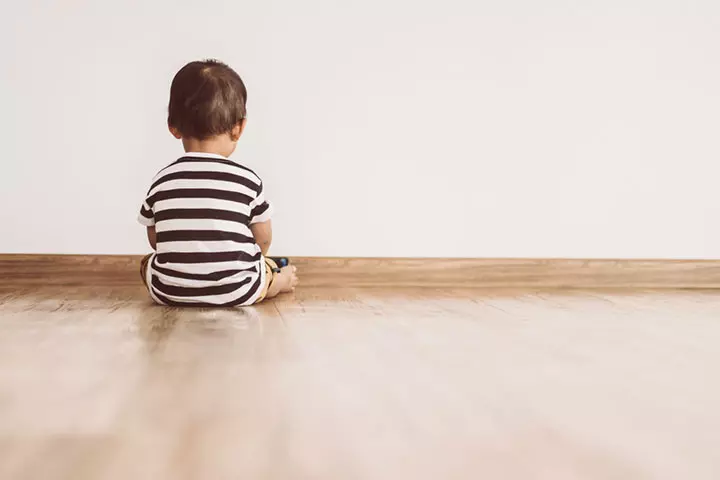
- Neurological disorders: Some neurological problems, such as rhombencephalosynapsis, may cause the vestibular system to malfunction leading to repetitive body movements, such as head banging (6). These disorders are genetic and mostly rare.
If a baby bangs their head only before sleep and when they are fussy, then it is likely a normal behavior and not associated with a problem.
When To See A Doctor?

Consult a doctor regarding the baby’s head banging behavior in the following scenarios (2).
- The baby has trouble falling asleep or does not sleep even after head banging.
- The head banging happens a lot throughout the day.
- The head banging is accompanied by excessive crying, tantrums, or developmental delays.
- The baby does not seem to get sound sleep even after head banging.
- The head banging continues even after an injury.
- The baby has developmental delays.
- The baby seems to have trouble maintaining body balance and coordinating the body movements.
- The head banging has led to any form of injury or seems to make the baby vomit.
- The head banging continues after the age of three years, even if the baby does not display any of the above-mentioned conditions.
The doctor would perform a physical exam, check the baby’s medical history, and conduct tests to determine any underlying cause for head banging in the baby. The treatment will depend on the reason behind head banging.
How To Respond To A Baby Banging Their Head?
If head banging is not due to an underlying problem and is a normal behavior, you could consider the following ways to respond to it.
- Observe the baby. Check if the head banging is because the baby is unable to sleep due to some reason, such as an uncomfortable crib or warm ambient temperature. Chances are, the baby is likely to stop head banging and fall asleep if the problem is addressed.
- Distract the baby. Many babies often stop the head-banging behavior when distracted. Each time you observe the baby banging their head, distract them by calling them or saying them something funny.
Stephanie, a mother of four children, followed a psychologist’s advice to prevent her son from head-banging. She says, “The psychologist recommended we teach Lucas (her son) to associate his crib with other things by distracting him with things to look at. She suggested I put some of his favorite toys in the crib with him. I tried this, even though I knew it wouldn’t work. Lucas threw out every single toy, book, and blanket I lovingly placed beside him (i).”
As can be seen in Stephanie’s example, distraction may not work as effectively in some cases, and alternative methods may be necessary to soothe the baby and address the underlying causes of head-banging.
- Soothe the baby. Swaddle the baby, rock the baby in arms, or cuddle them gently before placing them into the crib. You could also observe a bedtime routine, which includes a warm bath, singing a lullaby, or reading a book to calm the baby so that they fall asleep without the need for head banging.

- Try games and activities. If the baby head-bangs due to boredom, provide them with toys or play activities that will help them calm down.
- Teach baby to self-soothe. You can teach the baby alternative self-soothing techniques. For instance, you can provide the baby a pacifier before bedtime and naptime. The sucking action on the pacifier could calm and soothe the baby (7).
- Speak to the toddler. Talk to the toddler and understand what is causing the head banging. Older toddlers can communicate their feelings through simple words and sentences, which could help you understand the reason behind head banging.
- Minimize the risk of injury. Pick cribs and baby cots with cushioned guard rails or walls to minimize the risk of head injury due to head banging. It can help reduce the risk of injury while you are still figuring out ways to tackle it.
 Quick tip
Quick tipYou may try multiple methods and see what works the best to calm your baby and subdue the head-banging behavior.
Head banging, body rocking, and head rolling are all rhythmic movements performed by babies to self-soothe. The following are various other self-comforting techniques, including body rocking and head rolling (1).
- Body rocking: The baby moves the whole body to and fro while in the crawling position. They may also move their torso side-to-side while sitting down.
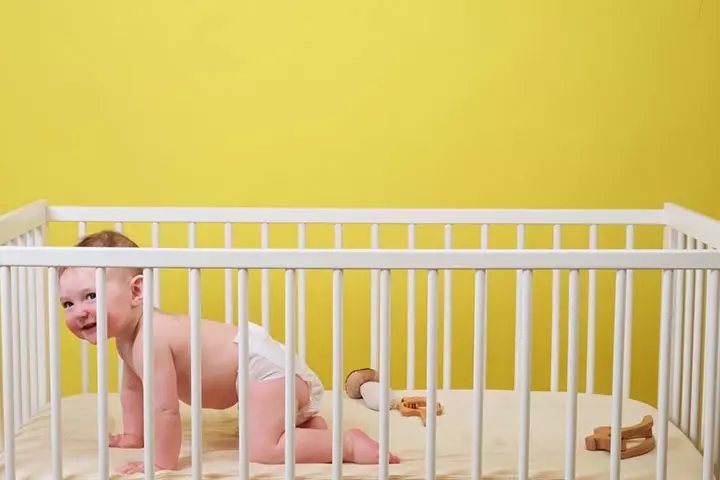
- Head rolling: There is a side-to-side movement of the head while the baby is on their back.
- Body or leg rolling: The baby may either roll the body or move their legs from side-to-side.
- Hand or leg banging: It usually occurs when the baby lies on the back. They constantly lift their feet and bang it back on the bed.
These movements usually start from the age of six to nine months. Babies may exhibit a couple of these rhythmic movements simultaneously.
Frequently Asked Questions
1. Why is my baby hitting their head with their hands?
Although it may appear worrisome, head banging is a common self-soothing technique in babies. It may involve your baby hitting their head and face with their hands. Doing so in a rhythm helps babies relax and become comfortable and is thus not a cause for concern.
2. Can head banging in babies cause brain damage?
Babies usually do not intentionally bang their heads hard enough to cause injury during head banging. However, keep an eye on your baby to ensure there are no potential hazards that your baby may accidentally bang their head against.
3. How do I know if my baby is alright after hitting their head?
If your baby’s head has bumped into something and they are alert and responding, keep an eye on them for the next 36–48 hours for signs of head injury, such as excessive crying, vomiting, fussiness, unresponsiveness, imbalance, or a bump on their head. Take your baby to the doctor as soon as you notice these symptoms (8)
Most parents find it disturbing to witness their babies banging their heads. However, sometimes, babies bang their heads when they are bored, stressed, or to soothe themselves. This habit is usually temporary and resolves as the baby grows older. Try to remain calm while dealing with this behavior. You may comfort them, distract or communicate with them, and follow a fixed bedtime routine to help manage their headbanging. However, if you notice any developmental delays or altered behavior patterns, do not hesitate to consult your pediatrician.
Infographic: What Should Parents Do If A Baby Bangs Head During Sleep?
Some babies may bang their heads rhythmically during sleep or naps, which is considered a sleep-related rhythmic movement disorder. In most cases, the condition resolves as the child grows. You may seek pediatricians’ help for diagnosis and management of it. Go through the infographic to know what to do when your baby rhythmically bangs their head during sleep. Illustration: Momjunction Design Team
Illustration: Baby Banging Head: Is this Normal Causes And How To Respond
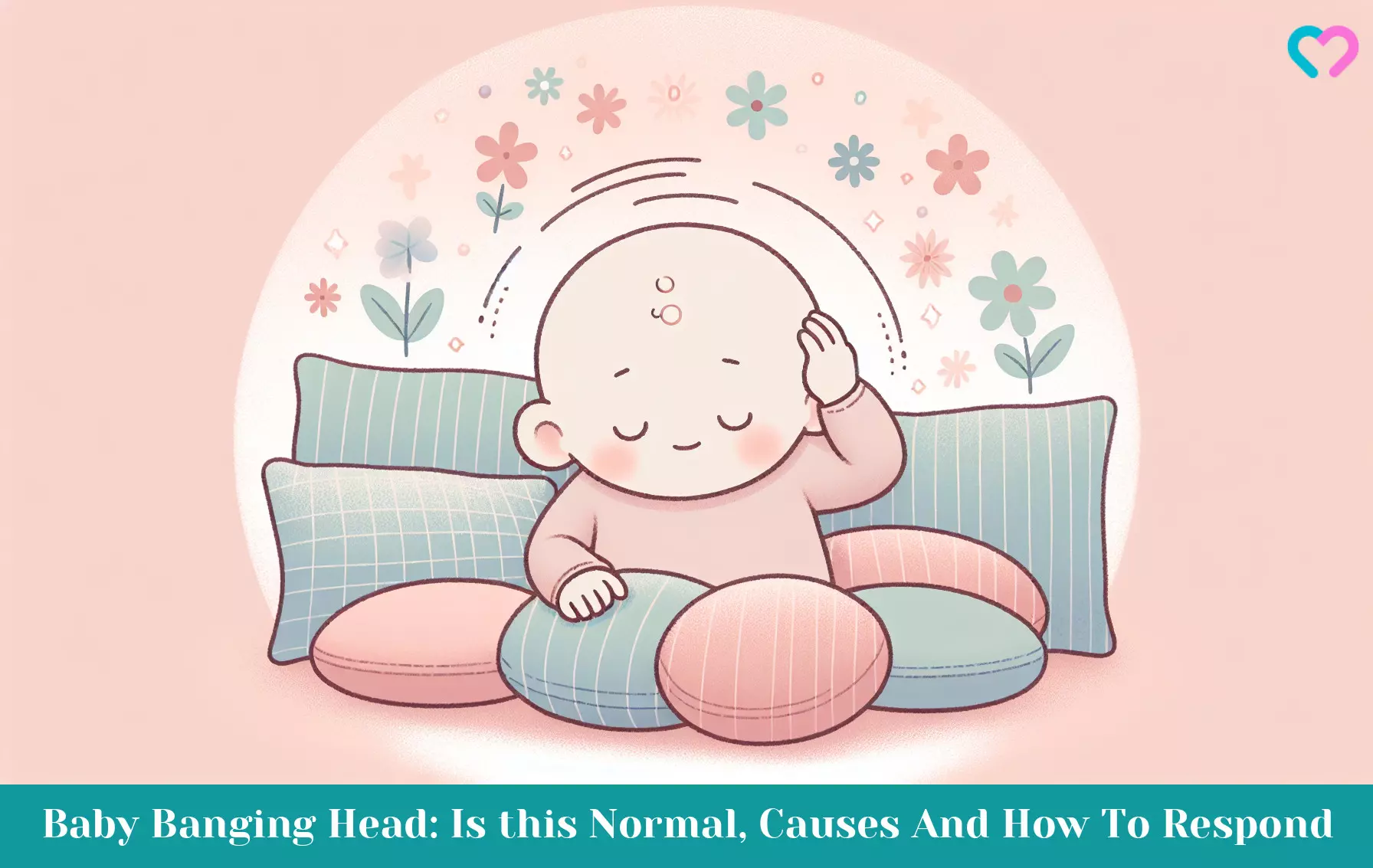
Image: Dall·E/MomJunction Design Team
Worried about your baby’s head-banging habit? The video below has the answers to help you understand if it’s normal or not.
Personal Experience: Source
MomJunction articles include first-hand experiences to provide you with better insights through real-life narratives. Here are the sources of personal accounts referenced in this article.
i. The head-banging continues;https://nullybabyblog.blogspot.com/2014/01/the-head-banging-continues.html
References
1. Body-rocking, head-rolling and head-banging at bedtime; Raising Children Network
2. Head Banging and Body Rocking; Cleveland Clinic
3. Spinning, rolling, and swinging! Oh my!; Penn State University
4. What are the Early Signs of Autism?; American Academy of Pediatrics
5. Stereotypic movement disorder; U.S. National Library of Medicine
6. Persistent figure-8 and side-to-side head shaking is a marker for rhombencephalosynapsis; National Center for Biotechnology Information
7. Pacifiers: Satisfying Your Baby’s Needs; American Academy of Pediatrics
8. Head Injuries and Children: When to Take Your Child to the Doctor; Sutter Health
Community Experiences
Join the conversation and become a part of our nurturing community! Share your stories, experiences, and insights to connect with fellow parents.
Read full bio of Maria Carmela Villania-Mamauag
Read full bio of Dr Bisny T. Joseph
Read full bio of Rohit Garoo
Read full bio of Shinta Liz Sunny








